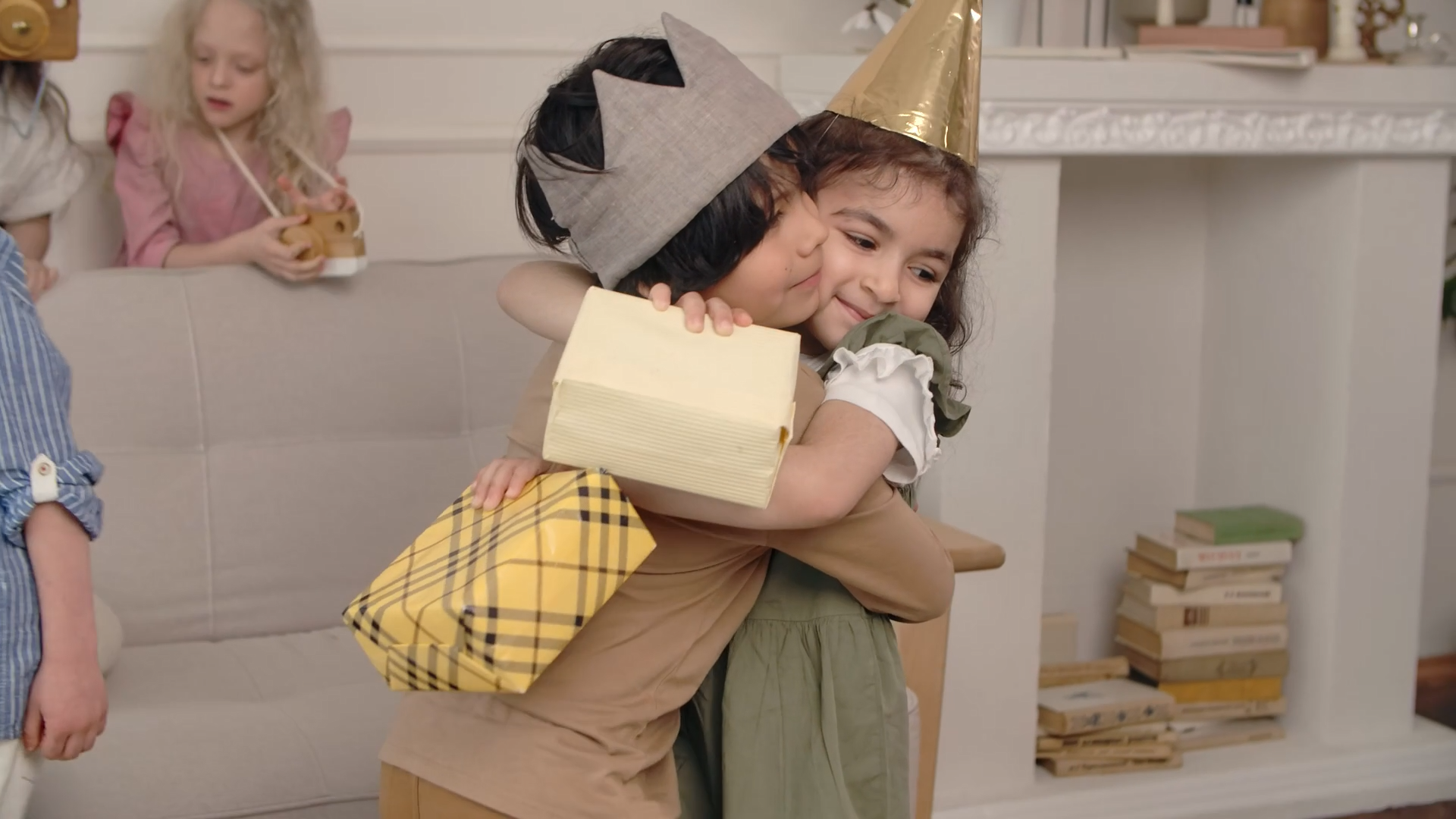Posted by Joanna Prokopova on 18th Sep 2025
The Science of Great Gift Giving: 7 Hacks That Actually Work
Gift giving is a tradition that transcends cultures and generations. A thoughtful gift makes someone feel seen, valued, and understood — it’s how we show appreciation, celebrate milestones, and strengthen bonds.
You don’t need to spend a fortune to make it meaningful. The magic — or is it science? — lies in paying attention, adding a little creativity, and weaving in thoughtfulness. From a handmade note to an experience to share, or a simple item that fits perfectly into someone’s life, the best gifts are the ones that connect straight to the heart.
In this guide you’ll discover:
- The science of why giving makes us happier
- Simple tips to choose thoughtful, memorable gifts
- How to balance meaning, surprise, and presentation
- Why the greatest gift of all is time
The Joy of Gift Giving
Research shows that giving doesn’t just make the recipient happy — it boosts the giver’s happiness too. In one study, 50 people were each given $100. Half were told to spend it on themselves, the other half on someone else. When their brains were scanned afterwards, those who gave to others reported higher happiness and showed more activity in the regions linked to generosity and pleasure.
“Oftentimes, people refer to it as the ‘warm glow,’ this intrinsic delight in doing something for someone else,” said Emiliana Simon-Thomas, PhD, science director at the Greater Good Science Center. She also explained that what makes gift giving different from winning money or receiving an award is that it’s social — it sparks the release of oxytocin, the hormone linked to trust, safety, and connection.
Unlike a quick dopamine rush, oxytocin sustains the feeling for longer. And it’s not just about the moment the gift is opened. Simon-Thomas noted that joy also kicks in while you’re choosing, shopping, or even wrapping — anticipation itself lights up the same pathways and is part of the whole experience of giving.
Of course, we don’t always let ourselves enjoy that happiness. Instead of leaning into the “warm glow,” we sometimes let anxiety take over — stressing about whether the gift will land, second-guessing our choices, or worrying it won’t be “good enough.” That pressure can dull the very joy that gift giving is wired to bring.
This guide will help you get that joy back!
7 Gift Giving Hacks
#1 Listen
A great gift makes someone feel valued, understood, and respected — and that starts with paying attention. Notice what they love (and what they don’t), and remember it’s not about you (no judging!).
If they’ve given you a wishlist or registry, don’t overthink it. Just get what they asked for. Research from Harvard and Stanford shows that people often skip practical or requested gifts in order to “prove” closeness with something unexpected — but that usually backfires. Listening well is more thoughtful than trying to outsmart the person you’re buying for.
Pro tip: Keep notes throughout the year on things people mention wanting or needing.
#2 Useful or Meaningful
The best gifts are either practical (something they’ll actually use) or meaningful (something they’ll always remember) — and when you can, make it both.
Givers often chase the big “wow” moment, picking something flashy because they can’t wait to see the reaction when it’s unwrapped. But once the party is over, the receiver is left with the gift itself. One study showed that people actually felt more cared for — and happier — when they received a functional rather than a fancy pen.
Sentiment adds another layer. According to a 2017 report in the Journal of Consumer Psychology, recipients prefer gifts that remind them of special events and relationships over ones that simply match their tastes.
Then there’s the material vs experiential debate. A 2016 Journal of Consumer Research study showed experiential gifts — like a concert or a cooking class — make people feel more connected to the giver, even if they don’t share the experience together. But other research the same year found that material gifts can sometimes win out in the long run, because they act as lasting reminders of the relationship or the experience itself.
So why choose? Blend the two! Seal an experience with a small token — a framed photo, a keepsake, even a handwritten note. Or turn a material gift into an experience by adding context. A book becomes more than a book when you write inside what you hope they’ll take from it.

#3 Quality over Quantity
One great item beats five random ones. A good gift doesn’t need to be expensive — but it should feel intentional.
Researchers note that we often try to “optimize and maximize.” When we’re unsure what the perfect choice is, we think variety will cover our bases — but that usually just spreads the budget too thin. Recipients are happier with gifts that have lasting value, not short-term excitement.
Sometimes the smartest move is to pool resources. A single, meaningful group gift for your boss will always beat a random pile of candles and bottles of wine.
#4 Personal touch
Customisation shows care. Adding inside jokes, favourite colours, initials, or thoughtful details communicates that the gift was chosen specifically for them. It can feel really good to receive such a gift, because it makes us feel special.
But like any rule, there are exceptions. Personalisation works best in close relationships and can feel out of place in others. It also shouldn’t be added just for the sake of it. Too much personalisation can make a gift less useful. Just because someone likes frogs doesn’t mean they want to turn up at work with a frog t-shirt, frog mug, and a frog-embroidered backpack.
#5 Surprise factor
Surprise amplifies emotion. The best gifts are often ones the recipient didn’t see coming but secretly always wanted. The unexpected element brings out stronger joy.
That doesn’t mean it has to be something they never mentioned — in fact, the best surprises often come from remembering those little hints. What’s better than hearing, “Oh my god, you remembered!” or “How did you know?”
Part of the magic is in the ceremony — not giving it away too soon, building anticipation, and letting the reveal do the work.

#6 Match the Occasion
Not every moment calls for the same kind of gift. Milestones like weddings, graduations, or big birthdays often come with higher expectations — and that’s fair. Registries exist for a reason, and sometimes the most thoughtful thing you can do is stick to them. Anniversaries are about showing commitment, while housewarmings or weddings are perfect for practical, lasting gifts.
Other occasions are lighter. For a dinner, a simple bottle of wine or flowers is more than enough. Secret Santa? Stick to the guidelines. In the workplace, or when buying for teachers or clients, keep it modest, professional, and tasteful.
Science backs this up too: gifts often act as markers of commitment or shared meaning. A well-chosen present at the right moment strengthens bonds and highlights the significance of the occasion.
And don’t forget the in-betweens. The small, unexpected gifts outside of birthdays and holidays can be just as powerful — sometimes even more so — because they catch people by surprise and show you were thinking of them without being prompted.
#7 Presentation
When we meet new people we know that first impression matters. The same applies to gifts!
After all the effort that goes into choosing a gift, don’t skip the wrapping. Presentation shows you cared enough to finish the job — it sets the stage before the gift is even opened.
Research in the Journal of Consumer Psychology found that wrapping changes how people feel about the gift. Neat wrapping raises expectations, which is great if the gift matches up. More casual wrapping sets the bar lower, so the gift itself can feel like an even bigger win. It also depends on the relationship: tidy wrapping works well for colleagues or acquaintances, while close friends often enjoy the fun of something a bit more relaxed.
The point isn’t perfection — it’s presence. A ribbon, a folded sheet of paper, even wrapping it in newspaper comics can make a gift feel intentional. Handing it over unwrapped, though, risks sending the wrong message: rushed, thoughtless, or careless. A few extra minutes of wrapping can make all the difference.

Bonus tips
- Don’t leave it to the last minute. If you start shopping too late, the perfect gift might be out of stock or stuck in a depot. Instead of joy, you’ll only feel frustration — don’t do that to yourself.
- Add a personal note, even from afar. If you’re shipping a gift straight to someone’s home, many shops (including ours) are happy to slip in a handwritten note. Always follow the tracking too — if they don’t know it’s coming, they might miss the delivery altogether.
- If you do leave it late… go digital. E-gift cards, subscriptions, or online courses are available instantly and can still feel thoughtful.
- Shop all year round. Pick things up on sale, stash them away, or splurge on something special you wouldn’t normally stretch for. Future-you will thank present-you.
- Mind cultural differences. Don’t assume every tradition is the same — a little research can go a long way in avoiding awkwardness.
- Avoid hidden obligations. A gift shouldn’t create work or costs unless you know the recipient wants it. Puppies, gadgets with pricey refills, or tools that demand upkeep can become more of a burden than a joy.
No socks. No mugs. No regrets.
I love gift giving — always have. It’s kind of like a puzzle to solve, and I make it my personal mission to find the right thing.
The fun part is, there’s no generally right answer. Socks, scarves, mugs — they are the safe, mundane choices, but sometimes that’s exactly what someone wants.
The best gift I’ve ever given was when I was 17. I used my savings to take my aging grandmother on a trip to Paris — a place she had always dreamed of seeing. We had a wonderful time together, and for years after we’d look back at the photos and relive those moments. Now she’s too ill to travel, and I’m grateful to my younger self for making it happen. No regrets. Don’t wait until you’re “ready” — just do it. Get the thing they’ve always wanted.
Gift of time
Studying all the research makes one thing clear: how much you spend isn’t what matters. If you gave someone a stick of gum, they wouldn’t be disappointed because it was cheap — they’d be disappointed because you didn’t make any effort. At the heart of it, people just want to feel seen, heard, and cared for. Even if they don’t always admit it.
Sometimes people say “Don’t get me anything.” I’ve always thought those are the ones who need the gift the most. Maybe they’re afraid you’ll think they’re superficial if they ask for something. Maybe it’s a way of protecting themselves from disappointment. What they don’t realise is that they’re also robbing you of the joy of giving. And if that door’s closed, well, you can always find someone else to give to.
As adults, we don’t create gifts as often. Homemade gifts are often seen as more thoughtful, but I think that when we grow older, effort is already implied in the hours we spend working to earn the money to buy the gift. There are plenty of ways to make something feel personal without making it by hand.
At the end of the day, the most precious commodity we have is time. It takes time to make a gift, time to earn the money to buy it, and time to give it. And that’s what makes it meaningful — the simple fact that someone chose to spend their time on you.
If only you could gift more time! All the gift shops would go broke.



